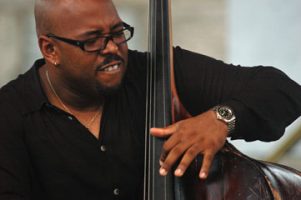There’s a very true cliché that jazz musicians, producers, promoters and other industry folks like to deploy in case of emergency, when something that had been carefully planned goes awry. It goes something like: Jazz musicians can improvise, so this unexpected logistical hiccup is really just another opportunity for inspired spontaneity.
It came in handy at Newport on Saturday afternoon, when DJ Logic’s Project Logic was stuck in traffic and running behind for their 2 p.m. set on the Quad Stage. The project’s keyboardist, James Hurt, was already on-site, and swooped in for the save, playing an off-the-cuff mini-recital that he dedicated to the late Bernie Worrell and which also featured an interpretation of Prince’s “Crazy You.”
Worrell was a good touchstone for what Hurt unrolled: synth effects from outer space, intimations of classical training, James Booker-isms—all woven into a suite-like form that drew applause like a main event. DJ Logic’s Project Logic, a revolving cast of vamp-savvy improvisers conducted by the turntablist, wasted little time, making quick work of its setup and locking into a solid half-hour’s worth of grooves and soulfully nonchalant frontline interplay. With a lineup featuring saxophonist Jaleel Shaw, trumpeter Keyon Harrold, guitarist Vernon Reid, bassist MonoNeon and drummer Marcus Gilmore, even the full hour of set time would have felt truncated.
Following Project Logic was what will surely prove to be the weekend’s most poignant set, a tribute to the late Geri Allen. The influential pianist and celebrated educator, who died in late June at age 60, was scheduled to play with her collaborative trio ACS, featuring bassist Esperanza Spalding and drummer Terri Lyne Carrington. Paying homage here were three of Allen’s many disciples, pianists Christian Sands, Vijay Iyer and Jason Moran, each of whom played two songs.
In Iyer and Moran her impact was especially obvious. Iyer played her “Drummer’s Song,” from Allen’s book with her trio of drummer Paul Motian and bassist Charlie Haden, and you couldn’t help but relate the tune’s geometry to the rhythmically inviting, action-packed approach to exploratory jazz Iyer used in his sextet earlier. Allen’s effect on Moran was similarly evident, and his lyricism throughout her arrangement of “Lucky to Be Me” pointed up the balance of confidence and romantic vulnerability she applied to standards. More than anything, this lovely hourlong program underscored Allen’s essential yet still overlooked place in the jazz-piano lineage: The totality of her knowledge and ability—from the most blues-based, tradition-minded mastery, to both the visceral and intellectual extremes of the avant-garde—was a downright innovation.
Those sets stood out for me, but really Newport is best experienced by stage-hopping, which can act as a crash course in the current state of the music. Bassist and festival artistic director Christian McBride’s big band somehow managed to make funk in a large-ensemble setting sound vicious rather than corny. Henry Threadgill’s Zooid thrilled and bewildered yet again. (You could hear Threadgill’s units a thousand times and the shock of the new will still be there.) Saxophonist Benny Golson’s debonair storytelling silenced the noisy festival air in front of the smaller Harbor Stage. Drummer Antonio Sanchez & Migration took unison melodies into levels of heroism and excitement reserved for prog-rock. Snarky Puppy was its usual studio-perfect self, and songs like “Gemini” mixed consummate fusion musicianship with a serious knack for instrumental-pop craft. (There are lines to be drawn from Snarky to Herb Alpert and Martin Denny, and I mean that as a compliment).






More Stories
The Holland International Blues Festival 2024, 15 acts from home and abroad managed to charm the audience: Video, Photos
Photo album & Live review: An engrossing performances by any standards at Forest Live – Delamere Forest 2024: Video
Passionate wordsmith Stacey Kent with Jim Tomlinson and Art Hirahara at famous Tbilisi Jazz Festival 2024: Videos, Photos